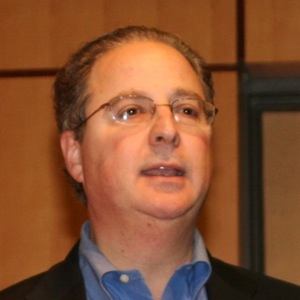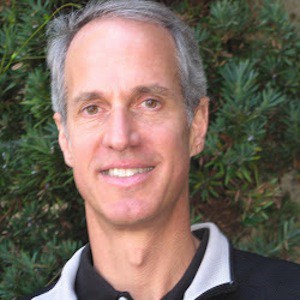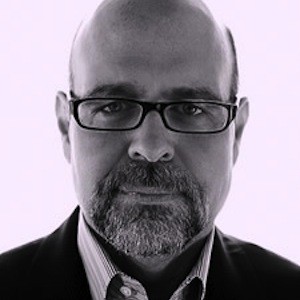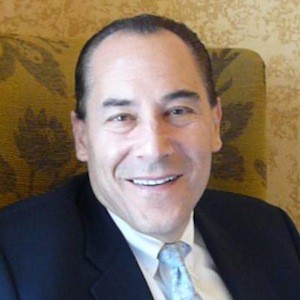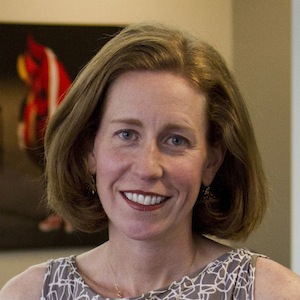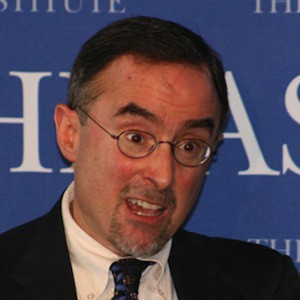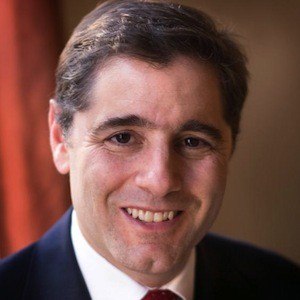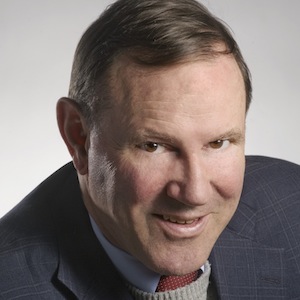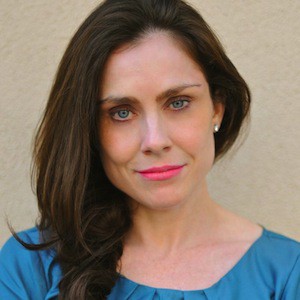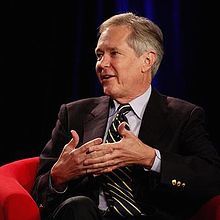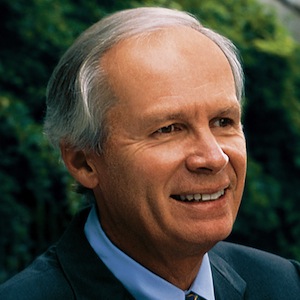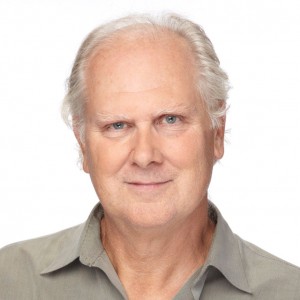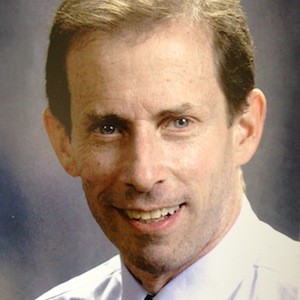Merrill Brown: So this is audio?
Paul Sagan: Yeah, that’s how we get our transcripts done. You can sit there, that’s fine. Yeah, that’s even better right here. That way I’ll get less side show.
Merrill: Now, you prepped me not at all for this.
Paul: That’s the way it is.
Martin Nisenholtz: That’s the way it is. It’s an oral history.
Paul: When you start to cry, I zoom in 60 Minute style. We’ve got this down, and you confess.
Merrill: There is one topic we could talk about that would lead me to tears.
Paul: What’s that?
Merrill: Mark Harrington, the late Mark Harrington who founded the cable network and who I worked very closely with. You must have known Mark from CBS, right?
Paul: Yeah, yeah. When did he pass away?
Merrill: He died in office like in ’98, ’99. He was just an extraordinary guy. We worked very intensely together. So there is one sad piece to the story, great guy.
Paul: Three, two, one.
Martin: We are here with Merrill Brown at [inaudible 01:30] Center on April 15th, Patriots Day, 2013 with Paul Sagan, Martin Nisenholtz, Merrill. Let’s start, Merrill, just with kind of a five minute, quick take on how you met digital journalism. What was the catalyst that got you into the business?
Merrill: In 1994 I became a consultant with a goal of trying to figure out what this Internet thing was all about. I thought it was going to be a big deal. I had written about technology, been involved in various text like ideas floating around, but in ’94 I actually put out a shingle and I got a bunch of consulting clients. A couple of start ups and Time Incorporated, which is where I probably met Mr. Sagan initially. I helped get Time on line, helped found “Time Daily” back in the Pathfinder, at least a slice of the Pathfinder era. And put “Money” magazine online. That was one of my client relationships.
The other large company client relationship was with NBC, who I helped develop a variety of video strategies in the ’95 ish time period.
Martin: And prior to that you were a broadcast journalist, just as a way of background?
Merrill: No. Well, prior to that I had been a print journalist for newspapers and the “Washington Post,” The head of corporate development at the Washington Post Company, the editor in chief and vice president of a magazine company owned by Norman Lear, and I was the editor in chief of “Channels” magazine, a media industry magazine in the mid to late ’80s. In ’90, I went to work for Bob Pittmanand Steve Brill to start Court TV, that’s actually where I met Paul Sagan.
Martin: Yeah, OK.
Paul: That’s right. That was in my New York One at Time Warner Cable, before New Media. And John Huey’s walked in right on cue.
Merrill: Mr. Huey, good morning.
John Huey: Good morning.
Merrill: So back to ’95 now. I fall in love with the Internet in ’94. Start consulting, trying to figure out some businesses to get involved in. Get involved with NBC. Microsoft comes along as an NBC partner. NBC asks me to get involved in that deal. As a consultant in early 1996, I sign on to the new joint venture to help them develop both, at the time, its video and Internet projects. I helped them get it launched in July, 1996. July 15th, 1996 it launches, and several weeks later, I guess just before that, they ask me if I want from suburban New York to Seattle to run MSNBC.com. In August ’96, I do.
Martin: So, talk about that. Talk about the founding of MSNBC.com in Seattle. It must have been an interesting thing to do. It’s one of the more interesting ventures because it combines a significant journalistic institution, NBC News, with a huge technology company.
Merrill: There were technology challenges around that. There were cultural challenges around that. There were journalistic challenges around that. It was a very intense period of time. Doing anything in real time news in the Web in that time period was challenging. The mere act of publishing was tricky.
Paul: And that you mean from a technical point of view.
Merrill: From a technical point of view, the content management systems were in their infancy. Trying to deliver, for NBC, real time news on this very, very fragile web platform caused a lot of friction, because they didn’t quite understand that when a plane went down or something happened, the turnaround time on that wasn’t the same as breaking in to a cable network or broadcast network. It, at the time, involved a variety of steps that we today take for granted in the content management world, but then it was rocky. As we all know, there’s, to a certain extent, a lot of this still isn’t figured out. Nobody’s mastered content management systems, but imagine it in ’95, ’96, it was even trickier.
Paul: Now I was going to say, one of themes that has come up talking to news organizations at the time was the inside versus outside question. Most opted at least to try to set up their digital news organizations a little outside of the news room, maybe across the river, but not across the country. How much of that was politics, economics or deliberate in terms of trying to make it work and take advantage of going to a tech center?
Merrill: Well, we thought about that a lot. I was part of the decision to do it, or at least I had a vote in the decision to do it. The feeling was that we would never get Microsoft to embrace any part of this unless we had a presence there. In a number of ways, that proved to be a good decision. It was a good decision, probably, looking back on it, to set up a newsroom there. We had lots of technology advantages. As everybody recognized quickly, we had a huge traffic advantage, because we had great distribution throughout their portal and other web properties, which was critically important to our early traffic success.
Martin: I’m sorry, Merrill, but one of the themes along those lines that really has come up repeatedly is that journalistic organizations really didn’t embrace technology very quickly. It took years for them to do that. The thing that’s so interesting about this operation, it’s almost unique, it is unique, is that it was born in a technology company surrounded by thousands of engineers. Talk about that a little bit. Was that a huge advantage? Couldn’t you almost immediately do things with the content that were being done in the pure plays, like Yahoo, that were not being done at more traditional journalistic institutions, because they had no engineers?
Merrill: That is correct. Being in the hub of thousands of engineers was a terrific advantage. We did figure out content management. We did figure out multimedia distribution. We were great, very quickly, at photos, which is and was a hugely valuable technology on the Web. Taken for granted today, but developing easy to distribute and easy to publish photo technology, which we spent a lot of time and effort on was very, very important and very valuable. The challenge was, however, to make sure we had the editorial balance right as we sat alone, 200 journalists and web producers in a technology company which did not respect anything, or even understand anything, about journalism ethos and so on and so forth. We had a lot of educating to do of the technology group out there, so they understood what a deadline meant and what breaking news was all about.
Martin: And you were isolated from the centers of power. You weren’t in Washington. You weren’t in New York. You were in Seattle. There isn’t a lot that happens, with all due respect to Seattle, it’s not, you know…
John: Hey, come on. Starbucks, Jimi Hendrix.
Paul: Besides those, it’s not a news hub.
Martin: It’s not a news hub, no.
Merrill: But it was an interesting time to be there because Starwave was doing very important work then. ABC News was sort of in Seattle as well. Starwave was. Kinsley and I went to Seattle simultaneously, so all that was going on.
John: Yeah, we talked to him about this, and he had some of the same observations about every culture. [coughs] Excuse me. Everything from contracts with journalists to just the whole employee/employer relationship, very different.
Merrill: And kind of who was in charge, because they had, maybe Mike talked about this, this program management mindset where the program manager really was the guy in charge holding all the levers. We had to build a level of rapprochement with them so that they understood that editors had to be empowered to make decisions, that all couldn’t flow through a program management Microsoft culture.
John: But you mean program management in the software delivery sense, not television programming at all.
Merrill: No. No. No. Totally in the Microsoft software delivery sense. Yeah. Absolutely.
Paul: Talk about where content is coming from. So 200 people spread across 7 x 24 is not really a lot of people, and that’s all in one place. That’s not bureaus. That’s not reporters. We spent some time talking about what’s going to set news free both in terms of dollars, but just in bulk. A lot of that was the wires between Reuters, what Yahoo did around the same time. NBC was a pretty big organization, NBC News, but not as large as major newspapers probably, at the time, or the wires, where did you get the news from? How did you think about appending, amending that in a ways that made it Web friendly?
Merrill: Multiple ways. First of all, we had probably at the time, 30 people in New York, under Lynn Povich, who was a key hire of ours, who was charged with integrating with NBC News. We had people in DC. The principle functions of those people in New York and DC was to attempt to extract words from television people, which was no small challenge, in part because they didn’t have, when we got there, desktop computers. They had only television news computing systems, which you’re quite familiar with Paul, and you all probably have never worked on.
Paul: They were closed systems.
Merrill: Dumb, closed systems. Yes. We had to figure out how to just give them even machines, and Microsoft could not understand it. There actually was an information company that didn’t operate on some Windows, or Windows like system from which we could actually get words. It was a very tricky thing at first. There was actually enormous resentment about the fact that they weren’t all racing toward Windows. We’re talking about 1996, ’97 here, when a lot of people in financial services and other industries were quite computerized. The newspaper business, I guess, was as well, but they didn’t have the need for it out at NBC. We had to literally go and sit down with them, interview Andrea Mitchell, and Pete Williams, and other NBC correspondents, take down their stuff, sometimes transcribed on the phone, sometimes, on notepads or on laptops, and literally pull content from them, so we could rationalize the expenditure of effort and money on NBC in the short run, where they had very, very few natural assets.
Interviewer: But this theme of separate, I want to continue to walk down this road a little now, because what I’d like to get from you is what you did as a result of that, that may not have been done in Legacy news operations.
Merrill: He was asking though about where we got content from, so I was explaining how we attempted to maximize NBC. What we did was create a newsroom that had its own rhythm, that was adjacent to, but not a part of, NBC News at first. We had to do that because we had to create native Web content. There was no alternative to it because video was so hard to produce and publish at the time. Almost all of it pre the cable network was minute 20 packages for the 6:30 broadcast. There really was very, very little to mind at the beginning, as they tried to figure out what the cable network would be. Even when the cable network got off the ground, it was mainly chatter, as it is today, but really chatter. There was a bunch of people sitting around a table that Andy Lack had figured out would be the launch format for NBC. It was literally a bunch of young interesting new faces. People like Laura Ingram, and Ann Coulter, and others.
John: Rick Stingle.
Merrill: Rick Stingle was a friend.
John: Gary Ginsburg.
Merrill: Gary Ginsburg was a friend. Excellent memory Mr. Huey.
Paul: It was talk TV.
Merrill: It was talk TV, so there was nothing to do there. I wanted them to get to the content part of it but, we had to have an independent newsroom and independent journalists. A lot of people didn’t understand that at the time, because per your question, you’re part of this great big global news organization, broadcast news was still pretty preeminent at the time. NBC was a dominant brand. Brokaw was still there, etc., etc. But we realized very quickly we needed to create assets in order to create eyeballs and ad inventory.
Martin: You weren’t looking at CNN? Because they had launched a year earlier.
Merrill: We were looking at CNN. We were looking at “USA Today.” We were looking at the “Times.” That was the competitive set at the time, and we had them on our big wall, and watched them all the time. But every print company had way better assets than we did, because they had words. We had no words.
Paul: They had no TV promotion.
Merrill: They had no on air promotion, and they had no portal access as we did.
Martin: We had words but it was a 24 cycle. I mean, what we didn’t have…
Paul: We, the “Times.”
John: I’m sorry. Yes, we the “Times” had words but we had them at that time on a 24 hour cycle. The only people that I remember who were doing a great job of really being on top of breaking news were the folks at Yahoo News, for the reason that Paul outlined, they have access to the Reuters wire. And CNN, who somehow mastered this, despite the fact that they had a television operation very, very quickly.
Merrill: It was a television operation that had 20 years or 15 years, whatever it was, of breaking news experience. They knew how to go after a cover story in real time, which NBC didn’t know how to do. NBC didn’t have any years of doing that.
John: [inaudible 15:02] 24 7 cycle for 20 years.
Merrill: Right. So it was in the culture, at least. It wasn’t in the NBC culture, because they didn’t have a cable network until 1996. The only solution to the problem was to build significant, original, journalist capability, largely in Seattle, where people could produce stories, cover stories, do reporting. I sent them on the road. I sent people to the war in Bosnia. I sent people to the Middle East. In some cases, to facilitate NBC News producing content for the Web, but in some cases just to get us stuff.
John: But what that really means, “to facilitate NBC,” is to make sure you got something out of there because they weren’t giving it to you.
Merrill: Precisely.
John: Because you were a .com and they were a network system.
Merrill: Yeah. Nobody’s reading, “People are going to get news on the Web? What? We’re NBC News. What are you talking about”?
John: Just to remind everyone, there was no broadband, so there was no chance for them to have their talking head on, so what interest was there?
Merrill: Yeah. Dial up video is oxymoronic practically. You lived through, obviously, on many levels. We had to figure out ways to create content and change the cycle. That was very challenging. We spent a lot of money doing it, and hired lots of good writer producer types to do it, because NBC didn’t have any.
Paul: Was there a business model besides the fact that there were two rich parents at the time? Or what was the business model that was being pursued?
Merrill: Nothing but weak efforts that ad dollars, which Microsoft was terrible at for years, really, really terrible at it. We had lots of conflict about the fact that we couldn’t get their attention. In part because our inventory was worth 50 cents on a dollar to them, and Expedia’s was worth a dollar on the dollar. We had lots of tension around that issue. That was sort of the first generation tense issue in the joint venture, that the revenue model couldn’t get implemented in ways that were in our interest. We spent a lot of money as a result.
Martin: In “our” being?
Merrill: The JVs. The joint venture was a separate company. I was not a Microsoft employee. My people were not Microsoft employees. We didn’t have Microsoft benefits. We sat very much alone, in a lot of ways.
Paul: What happened, from a seminal point of view? Were there specific stories that changed the perception of the parents or made the JV stand on its own? Were their business moments or did it just never quite come together?
Merrill: No, it did come together. The late ’90’s were very good to MSNBC.com. Despite MSNBC cable’s absolute floundering performance, for many years. Until they figured out that going left was an answer, which wasn’t that long ago, as we site here in 2013.
Paul: So the cable network, from an audience point of view, and probably a revenue point of view, was an asterisk?
Merrill: Inconsequential.
Paul: But the online was not?
Merrill: The broadcast network was not. Among the really important things we did was aggressively and quickly integrate with Dateline, Today and Nightly News. We did this incredible thing of getting our URL on their screen. In 1996, ’97, the act of creating a lower third that had an Internet address on it and actually might have a reason to send people to the Internet, was adventuresome and revolutionary, in many ways. We were the most aggressive people to do that. In fact, in prime time broadcast television, we were the first people to do that. In doing some very clever things with Dateline.
Paul: So effectively, your promotion, or at least your impressions, were far greater than what CNN could drive to their own site, just by sheer numbers.
Merrill: We had two brand and audience strategic advantages that nobody had. A broadcast network that was willing to integrate with us and a portal that was fully integrated with us. Big, important advantages.
Paul: That drove you to be number one, two in audience pretty quickly?
Merrill: Right. And stayed that way until the mid 2000’s or early 2000’s. I don’t know quite when that changed.
Paul: But after you were gone?
Merrill: Right. But those distribution advantages were significant. I used to tell NBC, “We are playing the same game the cable network is. Although the distribution outlets aren’t John Malone’s.” In this case, not the equivalent of cable distribution. “We still needed to get on as many outlets as possible. If we didn’t have third part distribution, working with this obscure brand, we weren’t CNN from a brand point of view, we would be hopelessly in second place.” We succeeded at the distribution part of that.
Martin: Things got very good in the late ’90’s, as the .com boom. Your usage is great. MSN is supplying a lot of distribution. The network is advertising the URL. What happened during the .com bust? I guess you were in a good place. Because there wasn’t a whole lot of pressure to downsize at MSNBC. It might have been one of the only places that didn’t significantly downsize during that point.
Merrill: The operative word is “significantly.” We probably had to lose 15 percent of our cost side when all that happened. NBC was very freaked out about it, because they had a lot of challenges at NBC, in the Internet era. Welch got a little aggressive and went into Snap, and into a publicly traded portal play.
Martin: That was called Snap?
Merrill: Snap and NBC.com. That was a huge bust. They read a lot of their struggles. To this day, they haven’t maximized CNBC as an Internet propriety. They read their struggles as an indictment of the Internet. As opposed to raising questions about their own strategy. That put a lot of pressure on us. I remember Black coming to Seattle. Probably in early ’01 or around that time period, and saying to me, “At NBC, we’re thinking this Internet thing might be over.” Almost a direct quote. That freaked us all out. Because living on the west coast, in the Microsoft world, we knew this was 1.0, and 2.0 or 3.0 was ahead of us. This was just the beginning. We got through that. But that period was another chapter in the tensions in the JV. NBC was very discouraged about the prospects for the Internet.
John: Although, to be fair, the Internet still hasn’t exactly been Valhalla for the broadcast networks. It’s not a great part of their business.
Merrill: Well, Hulu’s pretty important.
John: No, it’s obvious the Internet didn’t go away. But it’s also obvious that, for network television, the Internet still looms over their business. But they haven’t made a lot of money on it.
Merrill: The disruption we’ve been predicting for broadcast television hasn’t exactly happened the way we might have predicted it 10 years ago. Absolute truth.
John: They are disrupted. But they’re disrupted more by cable television.
Merrill: Right. Although we’d all love to be at Disney, owning ESPN, both .com and on air, which is now a dominant property in sports. You competed mightily with them.
John: ESPN is the greatest business in all media.
Merrill: Could well be.
Paul: A few observations, having worked in a bunch of places, lived through a true start up in online news. No matter how robust or not you think the future’s going to be for TV, online and the disruption to come, a lot of media companies have gone away, are severely diminished. Or, their digital businesses, even if they’re a few a few hundred million, are nothing compared to what they used to have. We all know the analog dollars to digital nickels comparisons.
Merrill: Dimes became nickels already?
Paul: Some people say pennies. How much do you think that was ringing the inefficiency out of the old, into the new? How much was the traditional players not understanding where engineering was going to play or how fundamentally different the world was? Or just the power of the disruptors who had the innovator’s dilemma on their side and they just have been running the table in some places?
Merrill: I’d say it’s a little of all of that. I’ve spent a lot of time railing against how slow old media moved and how little innovation came from them. Especially in the ’95 to ’05 period. What are the great inventions that came out of that world? Why was a guy in town house in San Francisco able to blow up the classified model? There are a lot of things that better leadership in the media business might have averted. But that’s ancient history now. So there’s that problem. But you can also look across industry, in general, and ask the same questions about Brentano’s, Barnes & Noble and lots of people who’ve been disrupted. Old businesses don’t move well into new eras. It’s kind of a business fact.
Paul: Or new businesses look totally different and the old business wouldn’t want to own them. I don’t think any of the old media companies would want to own Craigslist today. It is, compared to their businesses, a tiny business. They would have hoped it would never happen. Or even those who predicted it would. Arguably, Knight Ridder, we went to see Tony Ridder, were farther ahead than anybody, did some of the most interesting early work, during that period. Their business was simply destroyed. There wasn’t something to own on the other side. They were left outside when it was over.
Merrill: But they had opportunities to do things, like buy Yahoo, when it might have been very interesting to figure that integration process out. There were plenty of things to buy along the way, plenty of opportunities to invest in Facebook and Amazon and other things, at prices that, today, would make one chuckle.
Paul: Then you can only blame them for not being slightly smarter, because they were spending more time looking at it. But that wouldn’t be their business today. It might be their portfolio today, had they made the investment. It wouldn’t really be their business.
Merrill: I don’t know what would have happened if a media company had bought Yahoo in 1998.
Martin: I can pretty much guarantee it would have failed. Yahoo would have gone down the tubes. They didn’t have the culture to run Yahoo. You’ve just criticized Jack Welch for investing in Snap and taking it public, which was, in essence, the same thing.
Merrill: The only thing I’d be critical of was impatience.
Martin: That’s an important clarification. You feel that, instead of shutting it down, during that period, they should have stuck with it and I agree with that.
Merrill: Very little happens quickly in the worlds we’re talking about.
John: But before we drift off too far into the world of hypothetical, the biggest failure that everybody made in this business was failing to invent paid search. That’s what they failed to invent.
Merrill: Or acquire.
John: Yeah.
Martin: Yahoo tried. They acquired Overture, which was the original paid search company.
Merrill: Fair enough.
John: But you could turn that around and say, “Before that their biggest failure was to fail to invent the browser for the Internet, or failure to be Tim Berners Lee.” It wasn’t an engineering culture. They had huge profits, legacy profits that continued for a long time. Around 2001, all the bottom fell out of online business, in terms of being able to make money. Some companies had hundreds of millions of dollars in revenues and no profits. They looked at it and said, “This isn’t a very good business.” As you said, I think you said it well, they blamed the Internet, rather than their strategy. They pulled in their wings. That’s about the time paid search showed up and changed the world.
Paul: And swallowed the ad business.
John: Yeah. And as Paul has said, the news business is really the ad business. They don’t like to talk about it that way. That’s what happened to the news business.
Martin: Merrill, when did you leave MSNBC? Let’s get back to the oral history.
Merrill: 2002.
Martin: You leave MSNBC. You’re leaving just around the time things begin to start to improve, as all down cycles end. You then were pursuing local projects. Weren’t you interested in local journalism for a very long time?
Merrill: Was and still am. Immediately, though, I went to work at Real Networks, in Seattle, where I ran all of their consumer businesses. Worked a lot on pay models, as a matter of fact, there, which was very instructive. Did that for about a year and a half before returning to New York in ’05, to start a new life around local, among other things. I can walk through that, in some detail if you…
Paul: That would be important. And also define what local means. Because the size of the market matters a lot, in the definition to the business model.
Merrill: In 2005, came back to New York, in part to run News21, a piece of the Carnegie Knight initiative on the future of journalism, in which I founded a graduate student fellowship program that operated here at Harvard, at Northwestern, Columbia, USC and Berkley. Did that for two and a half years, with about a third of my time. That was a very important thing in my life at the time and hopefully a contribution of some note. It’s now at Arizona State where it has a permanent home and a permanent staff, and 14 universities and is thought to be, in that world, a successful thing. So that was one thing I did. Then I joined boards and did a variety of consulting things. A number of them with newspapers. A number of those things led to my efforts to try to raise money to start small, local news sites in metropolitan areas. Something that, to this day, nobody’s really quite figured out and which Patch and others are trying to figure out. I attempted, got very close to, raising money. Is everything on the record here?
Paul: All on the record.
Merrill: What should I say? This will be public at some point?
Paul: It will. So you should be truthful, exhaustive and name names.
John: Because it’s for history.
Merrill: The closest we came to getting our local business financed, I had three partners in this business, was during a period of time in which we were incubated at Gannett. We spent an enormous amount of time in Virginia with them, with the theory being that we were going to create in partnership with Gannett and “USA Today” local news sites that would live on a URL like “usatoday.com/philadelphia.” We would have this joint venture company that would be venture backed and backed by them. We spent five months at this. We had a complete sales plan involving their local sales organizations. We had target markets all lined up. We had a letter of understanding. We had a finished MOU done and lawyered, which me and my colleagues financed at some expense, because it was complicated. In December of whatever year this was, I want to say 2006, but we may need a fact check on this, the principle champion of this, the then publisher and president of “USA Today,” Craig Moon, took it to the CEO of the Gannett Company for final approval.
He said to Craig Moon as it was recounted to me, “I don’t think this is a good idea. First of all, why do we need Brown and his group if you guys are so smart over at ‘USA Today?’ Secondly, how am I going to sit on the Boards of companies like Career Builder, with McClatchey, if we’re going after them in their own markets? I don’t want to do this.” That ended the most serious foray into actually raising money and getting us financed. We continued to try to get Venture money behind it, but as everybody in this room knows, getting Venture to back something like this, which is human heavy, is challenging.
Martin: Try to connect the dots looking backwards Merrill. Do you think it would have succeeded? There are a lot of folks that tried. BackFence, others…
Merrill: I was on the Board of Back Fence, by the way.
Martin: We might want to talk about that a little bit. that’s an important effort, but they failed.
Merrill: I’d like to correct you, because I really don’t think this has been tried, maybe for good reason, but nobody has gone out and tried to own metropolitan areas in a web savvy, low cost way. They tried to own suburbs. They tried to own pieces of it, Patch, BackFence, others, but nobody has actually tried to go into Baltimore with 12 journalists and figure out how to do something that would be competitive to the local newspaper and local television. I believe to this day, and until I’m proven otherwise, that that’s a viable model that somebody’s going to do, and in fact I’m on the Board of a company in Providence, Rhode Island now. I’m so committed to this, called GoLocal, which seems to be pulling this off in Providence and Wooster. Maybe those are the right size markets to get this figured out in.
It maybe has not been funded for good reasons, and I remain a Pollyanna about all this, but I do believe that if we gave Sagan, or Huey, or you or me, 15 people in Baltimore, we could figure out something with meaning and value. Once you get past the daily newspaper and local web traffic, the whole thing diffuses and there is room for a number two or a number three, or whatever, as long as the cost basis of it is managed well.
Paul: Does that always work, because 15 people isn’t going to…
Merrill: We don’t know that it’s going to work.
Paul: It won’t build the platform. Is your assumption that there has to be a national platform and you plug into it?
Merrill: The assumption behind the business I tried to raise money for was there was scale economies around, building the infrastructure for it, selling ads against it, having a centralized staff that did some of the work, but that from a hub you could build four, six, eight, ten of these that would make some sense.
Martin: It sounds a little like Patch though. Right?
Merrill: Except Patch is about coddling together, little town after little town, after little town. When a plane goes down in Baltimore, you have Towson, and you have Catonsville, and you have Pikesville, but you don’t have Baltimore. It seems to me that that’s missing a huge audience opportunity by simply redlining American cities. You’re not getting metropolitan area news and you’re not getting access to all those eyeballs that live in Baltimore or Philadelphia or Cincinnati.
Paul: In that example, would you stop coverage at the city line? We talked to Julius Janikowski last week. The FCC has obviously intersected some of these issues and he made the reverse point, not argument but point, which is some of the rules of either newspaper distribution of the DMA or broadcast license rules made people spread too thin in their coverage and, therefore, not cover enough in any one community that was relevant anymore. If you were in Baltimore, do you think the model is you cover the city but not the suburbs?
Merril: No, I think you cover the whole thing. To reinforce the fact that I’m still involved in this thing, I run a center called the Center for Cooperative Media in New Jersey, which has two components. One, the aggregation of New Jersey media, traditional media, including the “Bergen Record,” “Star Ledger,” and so forth. Secondly, a thing called the New Jersey Commons run by Debbie Gallant, who some of you know or know of. She founded BaristaNet. We have put together 60 hyperlocal blogs throughout the site, all of which are interesting at some level. We’re going to give them tools, we’re going to give them training about both journalism and data mining and revenue and all of it, and we’re going to do everything we can to build an infrastructure around New Jersey media as an alternative scenario to the ones we’ve been talking about.
There’s all this out there and it exists in Baltimore and it exists in Philadelphia and it exists in metropolitan New York. Somebody putting that together in smart ways, perhaps the only way to do this in the world we live in is through foundation money, which is what we’re reliant on now, but also maybe from an investment point of view, would have some scale.
John: This is all free content paid for by advertising?
Merrill: Yes.
John: The trend is not headed your way on that.
Merrill: Our traditional media partners like the “Bergen Record” and the New Houses in Newark and so forth are working aggressively on that. Newark has a paywall.
John: I don’t want to turn this into a business model debate but you’ve mentioned two experiences you’ve had and they were both joint ventures. Now you’re talking about a matrixed joint venture. You obviously are a glutton for punishment. That’s all I have to say.
Merrill: Fair enough, John. This center thing is really interesting in the context of this conversation. We have Patch in the center, we have the “Bergen Record” in the center, we have the “Star Ledger” in the center, we have Channel 13 in the center through their NJTV arm which produces a half an hour of news for New Jersey and is on channel 13 every night called NJTV. We have Laura Walker and WNYC in the joint venture with Jim Shackter running a thing called NJPR. We have all these interesting assets in one place.
Paul: It runs as a not for profit?
Merrill: For now, yeah, funded by Dodge and Knight.
Paul: You have both commercial and not for profit content?
Merrill: Yup.
Paul: I don’t think anyone else is doing it on that model at that scale.
Merrill: I don’t think so. To the point, I’m still trying to figure this out now with a different model, with a different set of assets, and maybe we can get it figured out. It’s very interesting.
Paul: Do you know what victory looks like?
Merrill: Another round of foundation funding and teaching these hyperlocals about revenue, which we’re doing. We have an ad platform for them. There’s an ad company in New Jersey that’s trying to service all this in an interesting way. We’ll see if we can get that figured out.
Martin: In some ways, although he’s doing it a little more commercial basis, it sounds, to some extent, like what Tim Landon is trying to do in Chicago. He’s very focused on bringing up a local business. I think his economics are skinnier than yours. I don’t think he feels that he can support 15, but maybe that’s because he’s doing it from a narrower perspective geographically. I don’t know. You should talk to him.
Merrill: It’s been a year or so since we’ve talked. We should. Thank you. Good point.
Paul: What haven’t we asked you about?
Merrill: Obviously we compressed six years of MSNBC into 20 minutes so there’s a lot that went on there. I don’t know how instructive, at this point in time, much of it is.
John: It’s a part of the early story which is very important.
Merrill: It’s a very important part of the story, and the part of it that I’m proudest of is that we actually did journalism. We hired a lot of really good journalists who did amazing things. Like go to Bosnia, and we broke stories, and we did investigative reporting, and we got known for some of that then. There is some disappointment, that those of us who were involved in that field of Internet Journalism has been bumpy. We still, to a certain extent, rely on the good graces of Reuters and AP to publish content.
John: How do you, if you look at the trends today, there’s this incredible increase in the number of people who get their news from Twitter and Facebook, but especially Twitter, how do you get your news?
Merrill: I’m on Twitter just about every day, using it as a marketing vehicle. In other words, that’s how I find out what Krugman’s writing today, or what various people who I follow are doing. I get my news from an array of daily visits to relatively dimensional places. There’s no magic in it, other than the first thing I look at is Twitter in the morning.
John: I believe that recently, NBC took back MSNBC from Microsoft. I don’t know precisely what the…
Merrill: NBC paid $300 million, it was disclosed, to get all of it back, So Microsoft is out of the business now.
Martin: What do you think happens from here? Do you have any thoughts about what happens now that…
Merrill: With that undertaking?
Martin: Mm hmm. It’s your baby. You must have thought about it.
Merrill: Vivian is starting it all over again as an NBC News wholly owned property, and as a separate left leaning website called MSNBC. What it was is kind of over. What was built in Seattle is being changed, and in some ways blown up, which is sad in many ways because of the point we made earlier about the nexus of technology and media. That interesting experiment that still has so much, at least theoretical, promise in terms of mobile and video, and so on and so forth is gone, and NBC News has no technology resources to speak of. I think that’s a lost for them, not that Microsoft has actually figured everything out here in bold fashion.
It’s still a technology company of 20,000 people with enormous engineering resources that could be better used. Microsoft is now hiring news producers because they want to have their own news content. They’re getting back, and they’re getting into the stand alone news game in some fashion that’s unclear externally.
Everybody knows they need to be in the content production game in some fashion, including Microsoft. They’ll just be doing it on their own and largely with third party content. All that is disappointing, because I think ABC News Yahoo, again, demonstrates that putting some technology and some media thinking together is an opportunity for at least traffic and revenue, and hopefully for quality content. They’re doing very well. It’s this model, in part, that they’re following. Good for them. We’ll see how it plays out.
